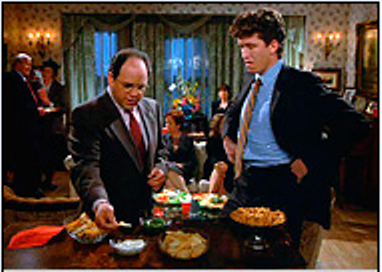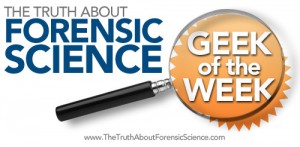IT’S HARD TO BELIEVE THAT AS THE WEEK 26 FORENSIC SCIENCE GEEK OF THE WEEK CHALLENGE IS UNVEILED HERE THAT IT HAS BEEN A FULL HALF YEAR OF THESE CHALLENGES. THANK YOU ALL FOR VISITING WITH US.
Forensic Science Geek of the Week
Thanks to the combined inspiration of Christine Funk, Esquire and Chuck Ramsay, Esquire, a new twist of this blog is being introduced. A weekly fun forensic science challenge/trivia question. The winner will be affectionately dubbed “www.TheTruthAboutForensicScience.com Forensic Science Geek of the Week.”
Rules:
- The challenge will be posted Sunday morning 12 noon EST.
- Answers to the challenge will be entered by responding to this blog post or the www.TheTruthAboutForensicScience.com FaceBook fan page.
- All comments that are answers to this blog will released after 9pm EST.
- The first complete and correct answer will be awarded the envious title of “www.TheTruthAboutForensicScience.com Forensic Science Geek of the Week”
- “www.TheTruthAboutForensicScience.com Forensic Science Geek of the Week” is entitled a one time post of his/her picture on this blog and the www.TheTruthAboutForensicScience.com FaceBook fan page. The coveted title will be his/her for that week. Additionally, a winner will be allowed one link to one webpage of his/her choice. Both the picture and the weblink is subject to the approval of Justin J McShane, Esquire and will only be screened for appropriate taste.
- The winner will be announced Sunday night.
- A winner may only repeat two times in a row, then will have to sit out a week to be eligible again. This person, who was the two time in a row winner, may answer the question, but will be disqualified from the honor so as to allow others to participate.
- This is for learning and for fun. EVERYONE IS ENCOURAGED TO TRY TO ANSWER THE WEEKLY QUESTION. So give it a shot.
Here it is:
The www.TheTruthAboutForensicScience.com “Forensic Science Geek of the Week” challenge question. Remember the first full and complete answer wins the honor and also gets his/her photo displayed, bragging rights for the week and finally website promotion.
OFFICIAL QUESTION:
This past week, the Chairman of the United States Senate Committee on the Judiciary, Senator Patrick Leahy (D-Vermont), and his staff announced the release of his proposed bill the “Criminal Justice and Forensic Science Reform Act (CJFSRA).” You can read his press release here about the Criminal Justice and Forensic Science Reform Act (CJFSRA).
This week’s Forensic Science Geek of the Week Question is a call to you the reader to be a guest blogger. I am asking you to read the draft, comment on it (the good and the bad). It should not be styled as a rant against it, but rather a balanced piece of reporting. If there is something of particular concern or something you feel is particularly praise worthy, then please articulate. The best entry will not only be our Forensic Science Geek of the Week, but also get a full sized blog post as a guest blogger about it.
So, in other words, for the extra work, you can proverbially double dip the chip.

- Double Dip the Forensic Science Geek of the Week Chip
The Hall of Fame for the www.TheTruthAboutForensicScience.com Forensic Science Geek of the Week:
Week 1: Chuck Ramsay, Esquire
Week 2: Rick McIndoe, PhD
Week 3: Christine Funk, Esquire
Week 4: Stephen Daniels
Week 5: Stephen Daniels
Week 6: Richard Middlebrook, Esquire
Week 7: Christine Funk, Esquire
Week 8: Ron Moore, B.S., J.D.
Week 9: Ron Moore, B.S., J.D.
Week 10: Kelly Case, Esquire and Michael Dye, Esquire
Week 11: Brian Manchester, Esquire
Week 12: Ron Moore, B.S., J.D.
Week 13: Ron Moore, B.S., J.D.
Week 14: Josh Lee, Esquire
Week 15: Joshua Dale, Esquire and Steven W. Hernandez, Esquire
Week 16: Christine Funk, Esquire
Week 17: Joshua Dale, Esquire
Week 18: Glen Neeley, Esquire
Week 19: Amanda Bynum, Esquire
Week 20: Josh Lee, Esquire
Week 21: Glen Neeley, Esquire
Week 22: Stephen Daniels
Week 23: Ron Moore, B.S., J.D.
WEEK 24: UNCLAIMED, IT COULD BE YOU
WEEK 25: Jon Woolsey, Esquire
WEEK 26: IT COULD BE YOU!!!!




Mehul B. Anjaria says:
Senator Leahy’s forensic science reform bill appears to be short on specifics and long on template. Problems with forensic science are no doubt ‘low-hanging fruit’ for political purposes. Nevertheless, it is encouraging that the 2009 NAS report is in fact on Washington’s radar.
The Bill’s primary concern is with the following NAS report findings: problems with scientific validation of processes, and lack of uniform and unassailable standards regarding accreditation, certification, and testing procedures. Notably missing is perhaps the most discussed recommendation of the NAS report: the call to take forensic science laboratories out of the hands of law enforcement. Bias (intentional and otherwise) is likely at the heart of many if not all of the issues in forensic science. While there is no easy solution, this particular recommendation is no doubt the gorilla in the room that needs attention.
The ‘Criminal Justice and Forensic Science Reform Act of 2011’ seeks to establish an Office of Forensic Science and a Forensic Science Board. By the way, this Office is proposed to be within the Office of the Deputy Attorney General in the Department of Justice. This may be a naïve observation, but placement of the new Office within the AG’s office at least academically again ignores the NAS suggestion of separation from law enforcement. Apparently there needs to be no further discussion of this issue according to Leahy’s Bill.
The Bill does specifically call for mandatory accreditation of forensic science laboratories. The ‘carrot’ is that accreditation is necessary for receipt of Federal funding. This is an excellent baseline suggestion that has already been de rigueur for forensic DNA laboratories. Also discussed is Federal oversight of accreditation. This step would likely assist forensic science in gaining at least the appearance of improved, universal regulation.
In a similar fashion, certification of forensic personnel is mandated in the Bill. In my view, this is a necessary step since many forensic personnel are simply not motivated to pursue certification simply for personal and professional satisfaction. This is a more academic observation, but its solution is also more challenging and interesting.
Money for research is of course called for in the Bill. There is a call to develop standards and best practices. The Bill starts go get muddied a bit here since these concerns would seem to overlap with accreditation and certification. Furthermore, there are already Scientific Working Groups sponsored by the FBI for this same purpose. Perhaps review of their effectiveness is first necessary.
In short, there does not appear to be anything terribly new in this Bill. Much of the language is in fact template, as it deals with procedures for creating Boards and groups, etc. Perhaps a more interesting study is to determine why forensic science seems to be struggling. What are the scientist’s opinions of their job function? Does training address the forensic scientist’s big picture role in the criminal justice system? One of the most memorable experiences I had in my training as a young forensic scientist was to actually go to a jail and see firsthand the effects on lives that my work would have. I fear that there is often a disconnect between widgets, test tubes, and understanding the power of forensic science in the world outside of the laboratory.
Separation of forensic science from law enforcement is philosophically and academically a great concept. The reality of its implementation is another story. This recommendation deserves study and should not simply be ignored due to its complexity and controversy. The proposed Bill is an admirable step in the right direction, and no doubt will undergo numerous re-writes.
Final note: there is exactly one mention of the defense bar in the entire document. The composition of the Forensic Science Board is proposed to be as follows:
-19 members appointed by the President
-No fewer than 10 members with ‘comprehensive scientific backgrounds’
-5 of the 10 must have extensive experience or background in forensic science
-At least one member from the following categories: judges, Federal Government officials, State and local government officials, prosecutors, law enforcement officers, criminal defense attorneys, organizations that represent people who may have been wrongly convicted, practitioners in forensic laboratories, and State laboratory directors.
Justin J. McShane says:
Awesome answer again. You win the Week 26 Challenge! It will also be re-posted as a stand alone post.